Best I Faced: Dingaan Thobela
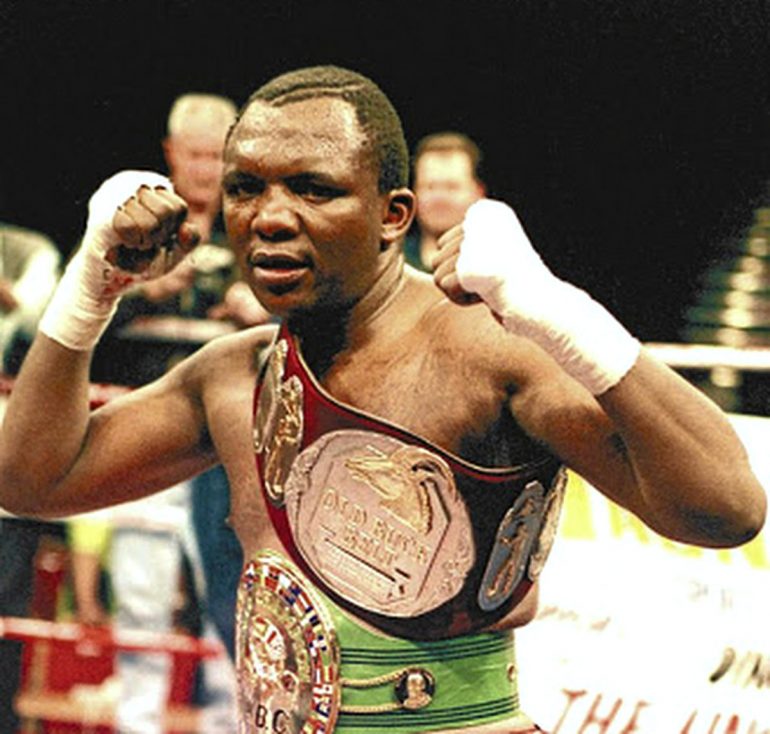
Dingaan Thobela won two versions of the lightweight title in early 1990s. However, it was several years and weight classes later that the tenacious South African put an unlikely exclamation point on an excellent career when he stunningly claimed the WBC super middleweight title in 2000.
Thobela, who was the third of eight children on his father’s side, was born in Soweto, South Africa, on September 24, 1966.
“Soweto helped make me what I am today. I come from the tough ghetto,” Thobela told The Ring. “It was tough in the sense of poverty; we grew up with nothing. My mother abandoned me when I was three months old. She took me to my grandmother on my dad’s side. She couldn’t raise me. My grandmother nurtured me.”
The youngster completed school and wanted to be a teacher. Life had a different plan, however.
“I was bullied by my elders, and boxing was a form of defense,” said Thobela, who came across the sport in his late teens. He quickly excelled under the guidance of Norman Hlabane.
“Norman had faith in me. He threw me into the amateur ranks,” said Thobela. “He was not there 80 percent of the time, but he would train me and prepare me, and then he would let me go with someone who would be in the corner with me. He saw I was skillful and handled myself against those guys.”
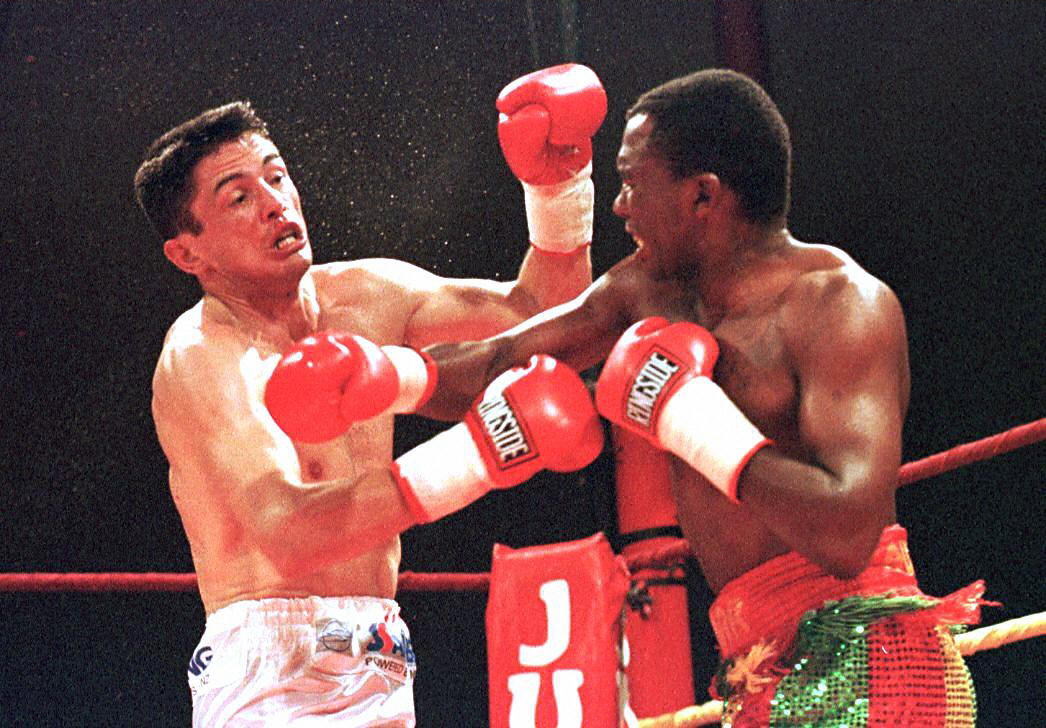
At the tail end of his welterweight phase in 1997, Thobela beat Gary Murray with a fourth-round TKO. (Photo by Walter Dhladhla/AFP via Getty Images)
Thobela went 80-3 as an amateur and won a national title before turning professional in June 1986.
“I fought a guy called Quinton Ryan; he was already earmarked to win a national title,” Thobela recalled. “I was paid R40 (about $16 at the time). Norman guided me. He went with me to open up an account.”
Thobela claimed the national junior lightweight title in his 13th fight by stopping Mpisekhaya Mbaduli in the eighth round. Two fights later, his handlers began to match him with former opponents of WBA titleholder Brian Mitchell — Thobela dispatched them in turn, first Daniel Londas (MD 10), then Danilo Cabrera (TKO 3), then Felipe Orozco (TKO 10).
“Felipe Orozco was a tall guy, awkward southpaw, and his jab automatically was incredible,” Thobela explained. “He fought Brian; he went the distance with Brian and he was troubling Brian, and some people said Brian lost against him.
“When I fought [Orozco], apparently everyone was saying I was behind on points, but I stopped him in the 10th round. It’s always good to have a cornerman who will encourage you and give you a tap on your back and tell you what to do. I think it was kill or be killed, and that was what my trainer, Norman Hlabane, emphasized: ‘Go all out now. Everyone thinks you’re behind.’ I went straight to him and I started throwing bombs and power shots, and it worked out for me.”
Those wins helped move Thobela, who was now campaigning at lightweight, toward a world title shot. But first, in his U.S. debut in April 1990, he would meet WBO 135-pound beltholder Mauricio Aceves in a non-title bout.
“They really underestimated me. They didn’t think I had a chance, but when I jumped into the ring, things changed,” said Thobela. “The first [fight], I won [when Aceves retired after seven rounds], but they didn’t sanction it as a world title fight at the time. I beat him and the WBO said [Aceves] had to defend against me.”
“The Rose of Soweto” faced Aceves again in Brownsville, Texas, the following September, this time with the belt on the line.
“They really underestimated me. They didn’t think I had a chance, but when I jumped into the ring, things changed.”
“I was more confident the second time around,” said Thoblea, who claimed a 12-round split decision. “I didn’t underestimate him, because I trained hard knowing that he is a world champion. We were well-prepared. He was strong and took all my punches. I caught him with a good couple of shots.”
Title defenses over well-respected Mexican Mario Martinez (UD 12) and former IBF featherweight titlist Antonio Rivera (UD 12) followed. However, Thobela vacated the title in search of greater recognition.
“The WBO was still new,” he explained. “I was one of the first WBO champions in Africa. [My team] realized that I have no challengers after fighting the top guys.”
A fight with Mitchell was touted but didn’t come to fruition.
“I wanted it. I think Brian wanted it,” he said. “Unfortunately, [promoter] Rodney [Berman] still says it today – he didn’t want it.”
Unperturbed, Thobela pushed on and followed in Mitchell’s footsteps by facing Tony Lopez for the WBA title.
“That was daylight robbery. I didn’t lose the fight; I won the fight,” said Thobela, who lost a contentious 12-round unanimous decision. “We fought in his hometown and it was a hometown decision. Even the [WBA] president [Gilberto Mendoza] was not happy and he [called for an] immediate rematch.”
Thobela even received a phone call from future president Nelson Mandela before the rematch: “[Mandela] said, ‘You have to make sure you win this fight.’ He spoke to me about it and what it means to [unify] the nation.”
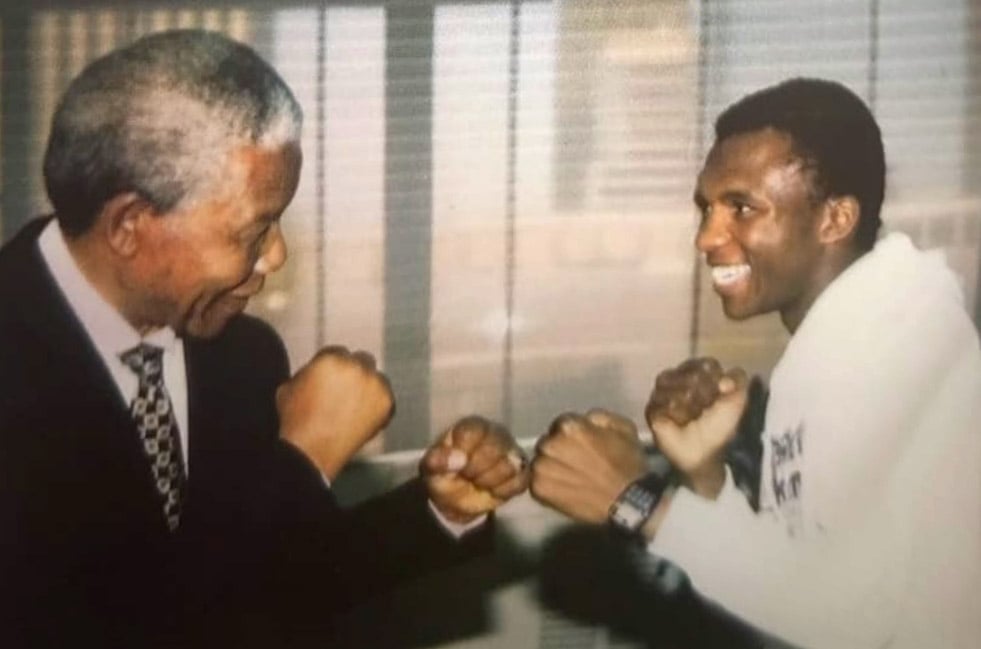
Thobela squares off with Nelson Mandela. (Photo courtesy of the WBC)
Thobela’s backers were able to persuade Lopez to leave the cozy confines of Sacramento and head to South Africa.
“It was the repeat of what happened in Sacramento, but everybody was watching them now,” said Thobela. “It was great to win a world title in front of thousands in the arena, millions around the country. Everybody still remembers that fight.”
Thobela lost his title to a largely unknown Orzubek Nazarov (UD 12) in his first defense. His team brought Nazarov back for a rematch, but again the South African lost a 12-round unanimous decision.
After several months away from the sport, Thobela returned up at junior welterweight in England against journeyman Karl Taylor, who was 11-22-2 at the time and would retire with a record of 16-142-7 in 2010. While that was supposed to be a building block toward a title run for Thobela, he was in for a rude awakening.
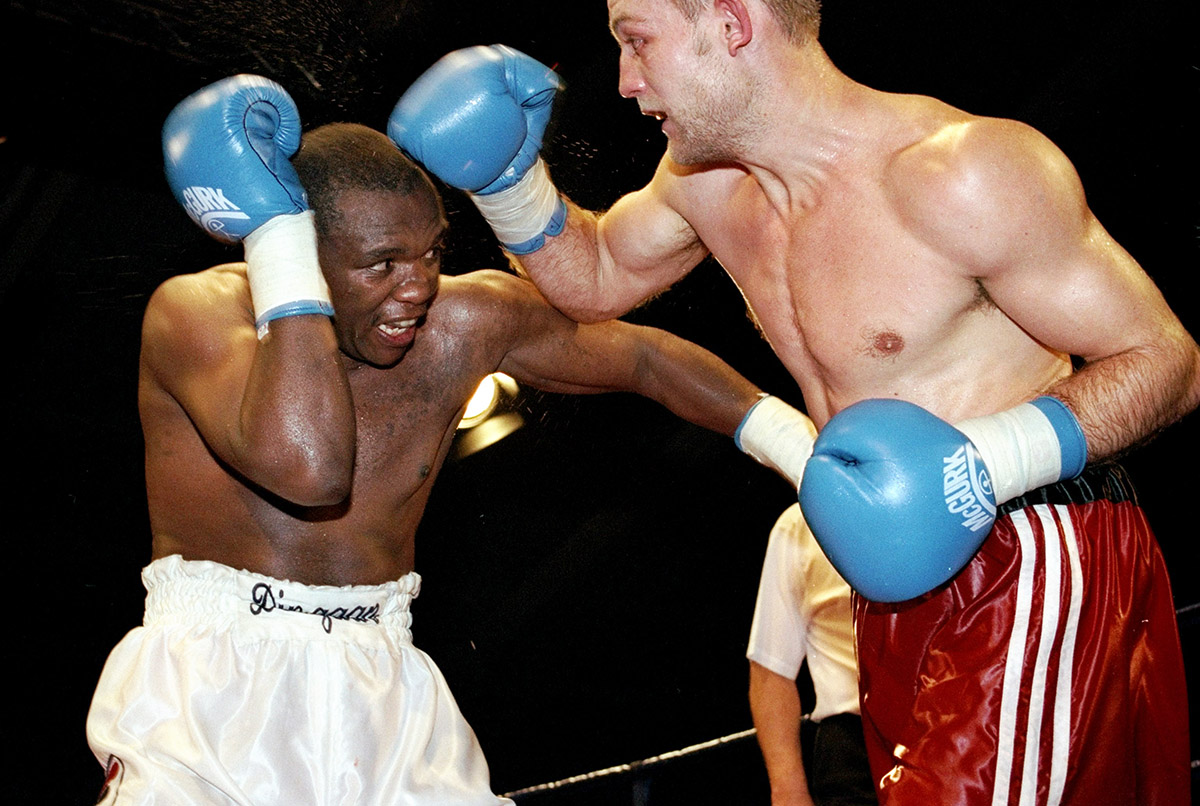
After dropping a majority decision to Cornelius Carr in 1999, Thobela would target the super middleweight division and pull off one final triumph. (Photo by John Gichigi /Allsport via Getty Images)
“I got an opportunity to redeem myself, and I was told, ‘Go to London,'” he said. “I got there and I was sure I would be victorious against Karl Taylor; I didn’t think I would lose. I thought I’d done enough to win and saw them raise his hand. I had to accept [the loss] as an athlete, that it is the judges’ decision.”
Over the next couple of years, Thobela’s weight began to rise and his career lacked direction. After rebounding with a series of modest wins, he lost a pair of welterweight contests against Geoff McCreesh (TKO 2) and Willy Wise (SD 12). That appeared to signal a fall from grace.
However, there were flickers of his old talent while stopping countryman Gary Murray (TKO 4) in 1997 and drawing with future Ring/WBC welterweight titlist Carlos Baldomir (D 12) a year later. Thobela then began to seriously struggle with making weight and fought as high as super middleweight.
“I was still dedicated, but people forget one thing: Any fighter can outgrow a division,” he said. “So, when I outgrew a division, people came out with the angle that I wasn’t dedicated. I still loved what I did. I wanted to prove I can still compete against the best fighters.”
A win over compatriot Soon Botes (MD 12) helped persuade Berman that Thobela could challenge for a world title at 168 pounds. Berman brought recently minted WBC titleholder Glenn Catley to South Africa in September 2000. Little was expected of Thobela outside his inner circle.
“People already wrote me off,” said Thobela. “[Catley] came from a big win over Markus Beyer, a tough, strong southpaw. Imagine after beating that man, I was next in line to fight him. I could have been scared, but I believed in my skill. People didn’t think I could compete at super middleweight, but I tested myself in the gym, because I sparred two top fighters – Harry Simon and Sugar Boy Malinga. I could handle them.
“I knew that people [did] not believe in jumping [up in] weight, citing laziness, that I am not dedicated.”
Thobela performed well but for much of the fight didn’t look like he was winning. In the final minute of the fight, Thobela was rocked by the defending champion, who pressed forward looking for the stoppage. However, Catley became sloppy and got caught and hurt by a murderous uppercut. A pair of right hands followed from the challenger, and Catley fell to the canvas. The Brit staggered up but was rescued by the referee.
“I cannot forget, it was very close; everyone said I was behind,” said Thobela, who was indeed behind 108-100 and 105-103 on two of the official scorecards and 104-104 on the third. “I dropped him and [stopped him with seven seconds left in the fight] – turned my life around.
“I celebrated it well, and those who didn’t believe in me anymore changed their minds. It was great.”
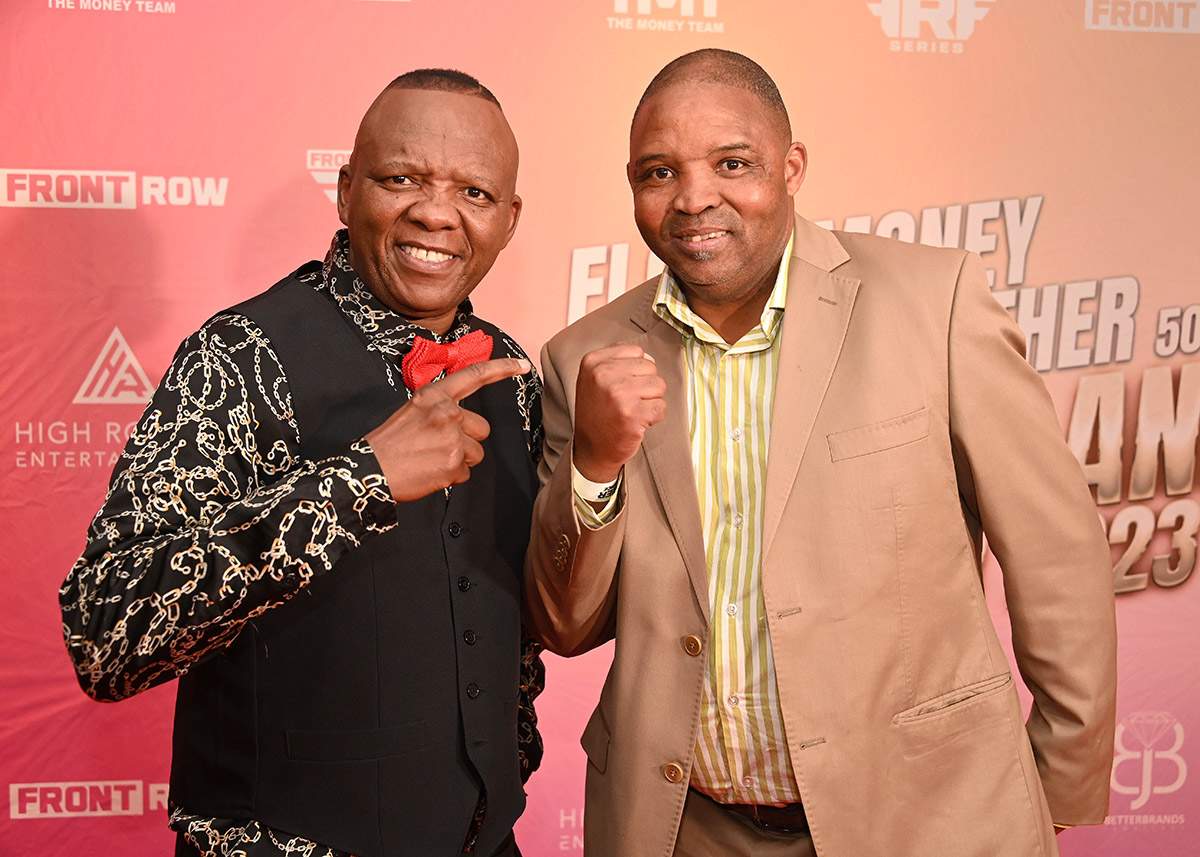
Thobela with Jan Piet Bergman at an event to honor South African boxers in July 2023. (Photo by Oupa Bopape/Gallo Images via Getty Images)
It was rumored that Thobela would face IBF titlist Sven Ottke in a unification. When that failed to materialize, Thobela instead fought and lost a controversial 12-round split decision against Davey Hilton in Canada. After Hilton went to prison, Thobela met another Canadian, Eric Lucas, for the vacant title but was stopped in eight rounds.
The South African then slipped into gatekeeper status for the likes of future titlists Mikkel Kessler and Lucian Bute before retiring, aged 40, after losing to old rival Botes (TKO 10) in October 2006.
Thobela is still involved in boxing. Before the late Lehlo Ledwaba’s passing, they worked together, running a gym called Hitachi, in Soweto. His old trainer, Hlabane, now takes care of the day-to-day activities at the gym. Thobela also owns a funeral home.
Thobela, now 57, is divorced, has four children and lives in Johannesburg.
He graciously took time to speak to The Ring about the best he fought in 10 key categories.
BEST JAB
Orzubek Nazarov: “He had a long, awkward jab. It was just right there [in my face]. It didn’t do any damage but delayed me from what I do best.”
via Ironbar Boxing on YouTube:
BEST DEFENSE
Mauricio Aceves: “It was not easy to land clean punches on Aceves. I fought him twice. He keeps his opponent at bay. When you step in, he wasn’t available, so you won’t be able to land your shots.”
BEST HANDSPEED
Mario Martinez: “He was very accurate. He would throw endless punches; he was very busy. He’d always make you fight.”
BEST FOOTWORK
Antonio Rivera: “Very slick. His footwork gave you acute angles, and when you fell for it that left hand was key. [He] knew if it catches you, you go.”
SMARTEST
Tony Lopez: “He was very crafty and very smart; he’ll make you work.”
via Ironbar Boxing on YouTube:
STRONGEST
Glenn Catley: “He was very strong and robust. When I jumped on the scales and I looked at him, I could see the power in him.”
BEST PUNCHER
Geoff McCreesh: “He’s the one who caught me. I didn’t see that punch coming. He was going down, he was groggy, I went straight for him and I hung my chin out there and paid the price.”
BEST CHIN
Mpisekhaya Mbaduli: “Even though I stopped him later, he took a lot of punches. It got to a point where it wore him down. He was taking every punch I was throwing and hit back.”
BEST BOXING SKILLS
Rivera: “Tony Lopez, Rivera and Aceves were very skillful. Rivera could come in and target your chin and catch it with his left. When we took the fight, we knew we must watch his left hand.”
BEST OVERALL
Nazarov: “Lopez and Nazarov were both great. I lost to Nazarov twice — that gives him the edge. He used his reach and good southpaw stance to his advantage, and it worked out well for him.”
More “Best I Faced” articles from The Ring
Questions and/or comments can be sent to Anson at [email protected].















